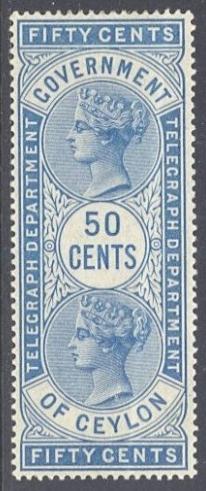|
Bonelli's Electric Telegraph Company
Bonelli's Electric Telegraph Co. Ltd. was formed in August 1860 by Henry Cook, an American, of 69 Lincoln's Inn Fields, London, and Eastbourne, with an initial capital of £25,000. The company was formed to exploit the telegraph system of Gaetano Bonelli of Italy, but the firm had limited success, and it failed in 1864. The company issued a number of telegraph stamps which are of interest to philatelists. It is unclear, however, whether the stamps were ever used as only unused copies are known. Hiscocks, Steve. ''Telegraph & Telephone Stamps of the World: A priced and annotated catalogue''. Woking: S.E.R. Hiscocks, 1982, p. 127. See also *List of historical British telcos This list of historical British telcos is a list of telecommunications companies that either existed prior to British Telecom's (BT) privatisation, or, if created subsequently to BT's privatisation, took over telecoms networks that existed prior ... References Telegraph companies of the United Kingdom ... [...More Info...] [...Related Items...] OR: [Wikipedia] [Google] [Baidu] |
Telegraph
Telegraphy is the long-distance transmission of messages where the sender uses symbolic codes, known to the recipient, rather than a physical exchange of an object bearing the message. Thus flag semaphore is a method of telegraphy, whereas pigeon post is not. Ancient signalling systems, although sometimes quite extensive and sophisticated as in China, were generally not capable of transmitting arbitrary text messages. Possible messages were fixed and predetermined and such systems are thus not true telegraphs. The earliest true telegraph put into widespread use was the optical telegraph of Claude Chappe, invented in the late 18th century. The system was used extensively in France, and European nations occupied by France, during the Napoleonic era. The electric telegraph started to replace the optical telegraph in the mid-19th century. It was first taken up in Britain in the form of the Cooke and Wheatstone telegraph, initially used mostly as an aid to railway signalling. Th ... [...More Info...] [...Related Items...] OR: [Wikipedia] [Google] [Baidu] |
Telegraph Stamp
Telegraph stamps are stamps intended solely for the prepayment of telegraph fees. The customer completed a telegraph form before handing it with payment to the clerk who applied a telegraph stamp and cancelled it to show that payment had been made. If the stamp was an imprinted stamp, it formed part of the message form.Bennett, Russell and Watson, James; ''Philatelic Terms Illustrated'', Stanley Gibbons Publications, London (1978) Usage In most countries, the cost of sending a telegram was paid using normal postage stamps. These can often be identified by their distinctive telegraphic cancels or punched holes. In some countries and at some times, special telegraph stamps were produced or postage or revenue stamps overprinted to pay the fee (e.g. Nicaragua, Ecuador). Private companies also issued telegraph stamps in countries where the telegraph network was in private ownership. The first telegraph stamps issued might be those of the English and Irish Magnetic Telegraph Comp ... [...More Info...] [...Related Items...] OR: [Wikipedia] [Google] [Baidu] |
Philatelist
Philately (; ) is the study of postage stamps and postal history. It also refers to the collection and appreciation of stamps and other philatelic products. Philately involves more than just stamp collecting or the study of postage; it is possible to be a philatelist without owning any stamps. For instance, the stamps being studied may be very rare or reside only in museums. Etymology The word "philately" is the English transliteration of the French "", coined by Georges Herpin in 1864. Herpin stated that stamps had been collected and studied for the previous six or seven years and a better name was required for the new hobby than ''timbromanie'' (roughly "stamp quest"), which was disliked.Williams, L.N. & M. ''Fundamentals of Philately''. State College: The American Philatelic Society, 1971, p.20. The alternative terms "timbromania", "timbrophily", and "timbrology" gradually fell out of use as ''philately'' gained acceptance during the 1860s. Herpin took the Greek root word � ... [...More Info...] [...Related Items...] OR: [Wikipedia] [Google] [Baidu] |
Steve Hiscocks
Dr. Steve E.R. Hiscocks (died 4 October 2010) was an expert on telephone and telegraph stamps who in 1982 wrote the first catalogue on the subject since Walter Morley's work of 1900. He also wrote the first ever catalogue of telephone cards (1988) and the first catalogue of telegraph seals (2007). Outside collecting, Hiscocks was a civil servant in the Department of Energy of the British Government."Calling collect – Collecting" by Robin Young in ''The Times'', 15 February 1992. Publications * ''Telegraph & Telephone Stamps of the World: A priced and annotated catalogue'', Woking, 1982. * ''The Collector's Book of Telephone Cards'', Woking, 1988. * ''The Collector's Book of Telephone Cards'', 2nd revised edition, Stanley Gibbons The Stanley Gibbons Group plc is a company quoted on the London Stock Exchange specialising in the retailing of collectable postage stamps and similar products. The group is incorporated in London. The company is a major stamp dealer and philat ... [...More Info...] [...Related Items...] OR: [Wikipedia] [Google] [Baidu] |
List Of Historical British Telcos
This list of historical British telcos is a list of telecommunications companies that either existed prior to British Telecom's (BT) privatisation, or, if created subsequently to BT's privatisation, took over telecoms networks that existed prior to the privatisation. BT and predecessors These are the early British telecommunications companies that were nationalised by the British government, the nationalised government organisations that succeeded them, and the privatisation entity that in turn succeeded those. Telegraph companies Between 1846 and 1868, that is, from the formation of the first company until the announcement of nationalisation, 64 telegraph companies were formed. However, 68% of them failed, and only a handful of them grew to any significant size.Kieve, Jeffrey L., ''The Electric Telegraph: A Social and Economic History'', p. 96, David and Charles, 1973 . *Anglo-American Telegraph Company * Bonelli's Electric Telegraph Company *British and Irish Magnetic Teleg ... [...More Info...] [...Related Items...] OR: [Wikipedia] [Google] [Baidu] |
Telegraph Companies Of The United Kingdom
Telegraphy is the long-distance transmission of messages where the sender uses symbolic codes, known to the recipient, rather than a physical exchange of an object bearing the message. Thus flag semaphore is a method of telegraphy, whereas pigeon post is not. Ancient signalling systems, although sometimes quite extensive and sophisticated as in China, were generally not capable of transmitting arbitrary text messages. Possible messages were fixed and predetermined and such systems are thus not true telegraphs. The earliest true telegraph put into widespread use was the optical telegraph of Claude Chappe, invented in the late 18th century. The system was used extensively in France, and European nations occupied by France, during the Napoleonic era. The electric telegraph started to replace the optical telegraph in the mid-19th century. It was first taken up in Britain in the form of the Cooke and Wheatstone telegraph, initially used mostly as an aid to railway signalling. This ... [...More Info...] [...Related Items...] OR: [Wikipedia] [Google] [Baidu] |
1860 Establishments In England
Year 186 ( CLXXXVI) was a common year starting on Saturday (link will display the full calendar) of the Julian calendar. At the time, it was known as the Year of the Consulship of Aurelius and Glabrio (or, less frequently, year 939 '' Ab urbe condita''). The denomination 186 for this year has been used since the early medieval period, when the Anno Domini calendar era became the prevalent method in Europe for naming years. Events By place Roman Empire * Peasants in Gaul stage an anti-tax uprising under Maternus. * Roman governor Pertinax escapes an assassination attempt, by British usurpers. New Zealand * The Hatepe volcanic eruption extends Lake Taupō and makes skies red across the world. However, recent radiocarbon dating by R. Sparks has put the date at 233 AD ± 13 (95% confidence). Births * Ma Liang, Chinese official of the Shu Han state (d. 222) Deaths * April 21 – Apollonius the Apologist, Christian martyr * Bian Zhang, Chinese official and ... [...More Info...] [...Related Items...] OR: [Wikipedia] [Google] [Baidu] |
Defunct Telecommunications Companies Of The United Kingdom
{{Disambiguation ...
Defunct (no longer in use or active) may refer to: * ''Defunct'' (video game), 2014 * Zombie process or defunct process, in Unix-like operating systems See also * * :Former entities * End-of-life product * Obsolescence Obsolescence is the state of being which occurs when an object, service, or practice is no longer maintained or required even though it may still be in good working order. It usually happens when something that is more efficient or less risky r ... [...More Info...] [...Related Items...] OR: [Wikipedia] [Google] [Baidu] |
British Companies Established In 1860
British may refer to: Peoples, culture, and language * British people, nationals or natives of the United Kingdom, British Overseas Territories, and Crown Dependencies. ** Britishness, the British identity and common culture * British English, the English language as spoken and written in the United Kingdom or, more broadly, throughout the British Isles * Celtic Britons, an ancient ethno-linguistic group * Brittonic languages, a branch of the Insular Celtic language family (formerly called British) ** Common Brittonic, an ancient language Other uses *''Brit(ish)'', a 2018 memoir by Afua Hirsch *People or things associated with: ** Great Britain, an island ** United Kingdom, a sovereign state ** Kingdom of Great Britain (1707–1800) ** United Kingdom of Great Britain and Ireland (1801–1922) See also * Terminology of the British Isles * Alternative names for the British * English (other) * Britannic (other) * British Isles * Brit (other) * B ... [...More Info...] [...Related Items...] OR: [Wikipedia] [Google] [Baidu] |
Telecommunications Companies Established In 1860
Telecommunication is the transmission of information by various types of technologies over wire, radio, optical, or other electromagnetic systems. It has its origin in the desire of humans for communication over a distance greater than that feasible with the human voice, but with a similar scale of expediency; thus, slow systems (such as postal mail) are excluded from the field. The transmission media in telecommunication have evolved through numerous stages of technology, from beacons and other visual signals (such as smoke signals, semaphore telegraphs, signal flags, and optical heliographs), to electrical cable and electromagnetic radiation, including light. Such transmission paths are often divided into communication channels, which afford the advantages of multiplexing multiple concurrent communication sessions. ''Telecommunication'' is often used in its plural form. Other examples of pre-modern long-distance communication included audio messages, such as coded drumbeat ... [...More Info...] [...Related Items...] OR: [Wikipedia] [Google] [Baidu] |
1864 Disestablishments In England
Events January–March * January 13 – American songwriter Stephen Foster ("Oh! Susanna", "Old Folks at Home") dies aged 37 in New York City, leaving a scrap of paper reading "Dear friends and gentle hearts". His parlor song " Beautiful Dreamer" is published in March. * January 16 – Denmark rejects an Austrian-Prussian ultimatum to repeal the Danish Constitution, which says that Schleswig-Holstein is part of Denmark. * January 21 – New Zealand Wars: The Tauranga campaign begins. * February – John Wisden publishes '' The Cricketer's Almanack for the year 1864'' in England; it will go on to become the major annual cricket reference publication. * February 1 – Danish-Prussian War (Second Schleswig War): 57,000 Austrian and Prussian troops cross the Eider River into Denmark. * February 15 – Heineken brewery founded in Netherlands. * February 17 – American Civil War: The tiny Confederate hand-propelled submarine ''H. L. Hun ... [...More Info...] [...Related Items...] OR: [Wikipedia] [Google] [Baidu] |







